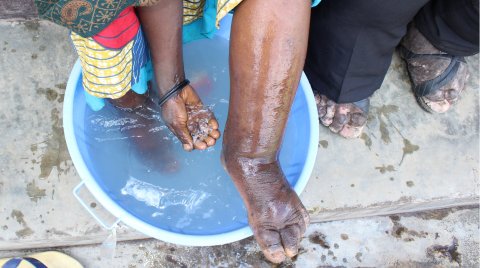In the year of NTDs, RSTMH publishes special issue of Transactions on podoconiosis
Today, RSTMH published a special issue of our journal, Transactions: “Podoconiosis – cross-disciplinary research updates in the year of NTDs”.
Edited and authored by some of the leading experts in the field, this special issue touches on a broad range of topics including priorities for research and implementation, diagnosis, mental health and stigma.
Dr Louise Kelly-Hope, Liverpool School of Tropical Medicine, Guest Editor of the special issue, said:
“This special issue puts the spotlight on podoconiosis, highlighting key research outputs and the critical issues that need to be addressed by the wider global community to help support endemic country programmes implement essential patient care to improve the quality of life of millions of people.”
Progress made, but more to do

Podoconiosis, or nonfilarial elephantiasis, is a neglected tropical disease, which causes massive swelling of the lower limbs due to chronic exposure to irritant soils.
Current global estimates suggest that there are 4 million cases of podoconiosis in Africa, parts of Latin America and South East Asia.
Much progress has been made towards eliminating suffering caused by neglected tropical diseases (NTDs) – since 2010 around 500 million fewer people are at risk.
The WHO NTD road map, which was officially endorsed in November 2020, will offer a plan to accelerate progress with countries, communities and people at the centre. However, there is still much to be done to leave no one behind.
Interminable cycles of poverty
Dr Kebede Deribe, Brighton and Sussex Medical School, Guest Editor of the special issue and an RSTMH Country Ambassador for Ethiopia, said:
“Podoconiosis keeps children out of school and parents out of work, and causes severe disability, stigma, discrimination and traps communities into interminable cycles of poverty.
“Access to podoconiosis interventions is unacceptably low, globally less than 4% of people with podoconiosis access treatment. Of the 32 potential endemic countries, only three have national control programme.
“Scaling up of programmes and interventions requires funding. There is significant shortfall of funding to ensure podoconiosis patients and their families are afforded the preventive and treatment services they deserve. New diagnostics and tools are critical to accelerate the control and elimination of podoconiosis, which highlights the importance of focusing in research and development.
“We must translate the research and evidence we have into patient care to improve the lives of people we serve. Inclusion of podoconiosis in NTD master plans and long-term health strategies of endemic countries is a critical first step.”
Access to services is key
Finally, Professor Gail Davey, Brighton and Sussex Medical School, third Guest Editor of the special issue and RSTMH President said:
"While this special issue shows the breadth and depth of podoconiosis research, it is vital to remember that treatment and prevention for patients and communities lag far behind.
“The next step is to ensure that all endemic communities have access to services. This is important not just for podoconiosis, but as a marker of progress towards Universal Health Care."
